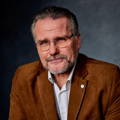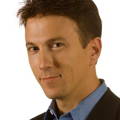Which technology can still blow your mind?
“Augmented reality, without a doubt. The ability to interact with multiple screens, to see a body part and move it around, to walk around it, to interact with objects in an intuitive way, has implications for healthcare. For education, for treatment, for telehealth. It’s one thing to see a video, it’s another to walk around in it. Surgeons are now starting to layer augmented reality features in their workflows. The blending of layers of information and realities is mind blowing.
“Another development I see as an oncologist is new ways of treating cancer, like immuno therapy. We are entering an era where we can diagnose cancer earlier on with a blend of information and genomics and personalisation – by gene seqencing and using artificial intelligence to come up with the right cocktail of approaches, something not even a very experienced oncologist can hope to come up with in their head.”
We are going from academical and top clinical healthcare to healthcare going into the homes and phones of people. What is the biggest challenge? Financial, behavioural, ethical issues?
“There are several challenges. One of them is simply connecting the dots. For example, how to get information such as blood pressure, measured when when you step on a smart scale, to your cardiologist. Not the raw data, but filtered information, so medical specialists can use it to give a heart patient more personalised and more effective advice.
“Another challenge to bring together all the fragmented apps, all the bits of data, and make it part of the day to day workflow of for example a general practitioner. AI technology can be used to make sure users ares not overwhelmed by all the data, but receive the information they need, when they need it.’.
“Another challenge is incentives for medical professionals. Mostly professionals are paid to see patients, to perform procedures. It might make more sense to prescribe a patient an app, or a sensor at home to help manage a chronic disease such as diabetes. That means less consults and procedures. Physicians don’t want to be knocked out of the loop, they want to be an enabler, getting rewarded for providing good care and not being replaced by technology. They should therefore be paid to enable preventive care.”
Measuring effectiveness of prevention
But how do you measure the effectiveness of a prevention program?
“That can be difficult. It can take years for the effects of prevention to manifest themselves. Let’s take hypertension. One in three adult European has it, less than half have it under control in terms of medication. It’s hard to get the primary hypertension data to the physician or the cardiologist in order to optimise medication or adherence. Technology can solve that. But you also need an incentive, like a bonus for the team involved if their group of patients gets a better control of their blood pressure. If you keep on influencing the outcome in thhis fashio, like in a feedback loop, you can achieve enormous cost savings and gains in health care.”
There are thousands of health apps for medical professionals. How can we filter the good from the bad?
“Right now most apps do one thing. They track your steps, your sleep, or your medication. In the coming years you will see more convergence, more integration of apps into platforms, like Apple is doing: using HealthKit to integrate information from different devices.
“In other words: less is more. Having 50,000 apps doing one fragmented thing is not helpful. What is helpful for a clinician managing a patient population, is to have the right apps and to have them integrated into the workflow. We don’t just need precision medicine, whe need precision digital health.
“That doesn’t mean a ‘one size fits all’ interface. It means a platform that, for example, knows different people with the same health problems have different carrots or sticks – different incentives - and that this can change over time. Your own personal health buddy that advices you and gives you directions.”
How long will it take to become normal for a physician to prescribe apps and being re-imbursed for that?
“Some five years ago there was a company called Welldoc that published a report on apps usage for diabetics. The report stated that using an app that simply reported blood sugar level into the feedback loop for a physician could lower the average blood sugar level by about two percent points, a big change. Since that time Welldoc has received FDA approval and its app is now paid for by Insurance companies. A good example of e re-imbursed, FDA approved prescribable app that has been shown to work in robust trials.”
Educating the professional
What about education, changing the curriculum. What sorts of programs and incentives can you imagine when it comes to help sitting crews as opposed to new and newly trained crews?
“Both sitting and new crews want the same, ensure better health. I think it’s perfectly possible to make the sitting crew change the way they work. We don’t have to wait for the next generation of doctors to be trained in this fashion. But you have to expand the education. Patients need to be empowered, to own their own health data, not just go to the doctor. That means you have to educate both the doctor and the patients and their families, to make them become part of this more integrated health care system. Sometimes this can be painful, because professionals might lose income or prestige. But healthcare is a team sport. With all these new digital tools we can have people realise that they are part of a bigger, smart healthcare system.”
When we look at the healthcare professional, how they acquire new digital skills, are they mostly early adopters, early majority, or perhaps laggards?
“Most physicians are trained to look at the body of evidence and have clinical trials to show something works. In this new connected and digital mobile age, professionals can see things can get done in a speedier, less expensive, more time appropriate ways by using new technoloy. They see this is useful. You no longer have to wait five or ten years for trial results. There are holdouts, but most people, both caregivers and patients, see the benefits. You give or share personal information, but you get better healthcare in return. It’s not just about shiny new devices or apps, its about what you can do sooner and better with shared information. I think that’s part of the solution, showing we can do healthcare in a much more integrated, realtime way.”
Health span versus life span
Do we really want immortality? What’s wrong with dying at age 80 or 90?
“It’s about health span, not just life span. While there are some people that want to live a lot longer, maybe even up to a 150, most people just want to be able to still move around at 90, being able to be around their loved ones, to be part of society. Maybe living healthier today will make that possible. That means big changes for society too. The average baby born now might live to be a hundred years instead of 75. What does that mean for retirement age, social security systems. How many times do you marry, how many careers do you have? Is 80 the new 50? There is much potential here, but also a lot of societal, ethical and financial questions.”
Are we addressing all the ethical questions flowing from new technical possibilities in a proper way? Is there enough debate?
“The exponential growth in technology benefits us personally and society as a whole. But as technology speeds up, the ethics and policies often don’t keep pace. With genomics and sequencing, questions pop up like what do we do with modification of DNA, of embryo’s? What is the role of artificial intelligence going to be in say 5 years? Who will get access to new health technology first. If we look ahead, we can see that 2025 will be a very different world. That gives us the opportunity to look at ethical questions now, to put in place essential safeguards and checkpoints now.”
The role of Singulary University
What is the role of the Singulary University in showing the future of technology in healthcare?
“What SU is doing at its core, is bringing really smart leaders together from across the technology spectrum, to inspire them as to where technology is heading. In particular, we help to empower them to use this technology for conversion to impact their surrounding such as in health care.
“The Internet of things is a perfect example. It’s now going into medicine, into healthcare, public health. Part of the role of the SU is giving people a picture of what is already here now. We can start to make sence of the massive and growing mountain of data collected through IoT applications, make it accessible for phycicians, caregivers, patients, doctors, nurses.
“We are just at the beginning of this internet of things coming into healthcare. It’s an explosion of exponentially growing data and an opportunity to mine that. It makes it possible to shift from intermittant and reactive sick care to a much more interactive and pro-active form of healthcare. The IoT is going to give us early warnings as opposed to having to wait for something to happen.”
What’s going to create a breakthrough in digital health in the coming two years?
“I think there will be a convergence of many breakthroughs in healthcare. But one that is just getting started I think is the collecting of huge amounts of information on e.g. medical conditions and getting new insights from them through crowd sourcing. For example, a recent research on the genome information of tens of thousands of type 2 diabetics, where researchers found three distinct subtypes of diabetics, who responded differently to their diets and medication. That can all be done by low cost sequencing and machine learning and by knowing what questions to ask. This can redefine diabetics, because now you no longer are just a type 2 diabetic, you could be a type 3 or 4 or even 10. That can happen with almost avery kind of disease, like cancer or heart failure. Classifying them into more distinct categorie scan help with smarter and more precise prevention, diagnostics and therapy.”
About Singulary University and Daniel Kraft
- Singularity University is a benefit corporation that provides educational programs, innovative partnerships and a startup accelerator to help individuals, businesses, institutions, investors, NGOs and governments understand cutting-edge technologies, and how to utilize these technologies to positively impact peoples lives.
- Daniel Kraft is physician-scientist, inventor, entrepreneur, and innovator. With over 20 years of experience in clinical practice, biomedical research and healthcare innovation, he has chaired the Medicine Track for Singularity University since SU’s inception, and founded and is Executive Director of Exponential Medicine, a program that explores convergent, rapidly developing technologies and their potential in biomedicine and healthcare.
- Daniel is board certified in both Internal Medicine & Pediatrics. Daniel’s academic research has focused on: stem cell biology and regenerative medicine, stem cell derived immunotherapies for cancer, bioengineering human T-cell differentiation, and humanized animal models.








